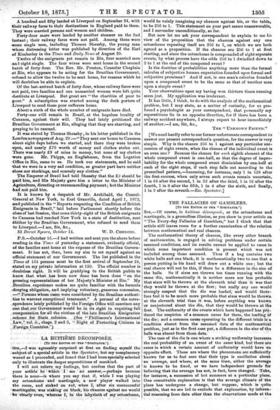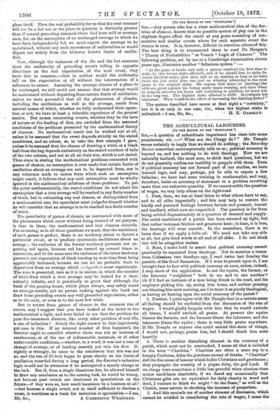THE FALLACIES OF GAMBLERS.
[TO THE EDITOR OF THE SPECTATOR...) Sin,—Of course, la huitieme decompose'e, or the octoscheme and martingale, is a groundless illusion, as you show in your article on "The Every-day Fallacies of Gamblers," but I think that that article still leaves room for a further examination of the relation between mathematical and real chances.
The mathematical theory of chances, like every other branch of mathematics, is engaged in solving problems under certain assumed conditions, and its results cannot be applied to cases in which some important condition is present which was not included among those assumed. Thus if a bag contains two white balls and one black, it is mathematically two to one that a person putting in his hand will draw out a white one ; but the real chance will not be this, if there be a difference in the size of the balls. So if sixes are thrown ten times running with the same die, mathematically it is neither more nor less probable that sixes will be thrown at the eleventh trial than it was that they would be thrown at the first ; but really any one would strongly suspect that the die was loaded; and would there- fore feel it to be much more probable that sixes would be thrown at the eleventh trial than it was, before anything was known or conjectured about the die, that they would be thrown at the first. The uniformity of the events which have happened has pro- duced the suspicion of a common cause for them, the loading of the die ; and a common cause operating in the different trials is a condition absent from the assumed data of the mathematical problem, just as in the first case put, a difference in the size of the balls was absent from those data.
The case of the die is one where a striking uniformity increases the real probability of an event of the same kind, but there are cases in which a certain amount of uniformity would have an opposite effect. These are where the phenomena are sufficiently known for us to feel sure that their type is oscillation about an average, and where, at the same time, either the average is known to be fixed, or we have independent grounds for believing that the average has not, in fact, been changed. Take, for instance, a succession of hot summers at a particular place. One conceivable explanation is that the average climate of the place has undergone a change, but suppose, which is quite possible, that we are led to exclude that explanation, by inferen- tial reasoning from data other than the observations made at the
, place itself. Then the real probability for us that the next summer will not be a hot one at the place in question is distinctly greater than if several preceding summers there had been cold or average ones, for, on the assumption of an unchanged average to which we have been independently led, we must expect the average to be maintained, without any such successions of uniformities as would depart too widely from the hitherto known limits of oscilla- tion.
Now, although the instances of the die and the hot summers show the uniformity of preceding events telling in opposite directions on the real expectation of the next event, they have this in common,—that in neither would the uniformity tell on the expectation at all without the intervention of a reference to causes. Assuming the average climate of a place to be unchanged, we still could not assume that that average would be maintained without departing from certain limits of oscillation, unless we were persuaded that all the phenomena of climate, including the oscillations as well as the average, result from natural causes of which, whether we fully understand their opera- tion or not, we have at least a tolerable experience of the general results. But causes connecting events, whether they be the laws of nature or the loading of dice, are excluded from the assumed conditions of the problems presented by the mathematical theory of chances. No mathematical result can be worked out at all, unless it be assumed that the event depends strictly on the stated conditions, and no others, as, to take the first example I gave, unless it be assumed that the chance of drawing a white or a black ball from the bag depends exclusively on the stated numbers of balls of the two colours, and not at all on their size, which is not stated.
Thus since in stating the mathematical problems connected with games of chance, no assumption is ever made that certain limits of oscillation about an average are not to be departed from, nor is any reference made to causes from which such an assumption might result, it follows that any such assumption must be wholly ignored in the mathematical solutions of those problems. To put the point mathematically, the stated conditions do not admit the assumption that a true average will be reached in any finite number of trials, but in estimating any real chance, as distinguished from a mathematical one, the speculator must judge for himself whether he will consider that an average is to be reached in a finite number of trials.
The peculiarity of games of chance, as contrasted with most of the phenomena which occur without being created of set purpose, is that in them, the mathematical and real chances coincide. For assuming, as in all these questions we must, that the machinery of such games is perfect, there is no tendency either to favour a particular event, or to produce systematic oscillations about an average ; the exclusion of the former tendency prevents our ex- pecting red again, because red has turned up several times in succession, and in the same case the exclusion of the latter tendency prevents our expectation of black turning up next time from being appreciably increased, because we can set no probable limit to
departures from an average which ex hypothesi occur capriciously. The case is presented, rare as it is in nature, in which the number
of trials from which a true average may be looked for is theo- retically infinite, and is practically so great that although the bank of the gaming-house, which plays always, may safely count on average results, yet no person staking against the bank can draw from preceding events any well grounded expectation, either as to the next, or even as to the next few trials.
But to return from games of chance to the common run of events, may I suggest that you have looked at the latter in too mathematical a light, and have failed to see that the problem for your fire-insurance director, like every other problem of real life, is one of induction ? Surely the right answer to that ingeniously put case is this. If an unusual number of fires happened, the director ought to consider whether there was not an increase of carelessness, or of the use of inflammable materials, or of other unfavourable conditions,—whether, in a word, it was not a case of change of average, or of loading secretly put into his dice. If, rightly or wrongly, he came to the conclusion that this was not so, and the run of ill-lack began to press closely on the limits of oscillation recorded during a long period, the director's inductive logio would not be erroneous if he anticipated a speedy change in the lack. But if, from a single disastrous fire, he allowed himself to draw any conclusion as to the coming luck, he would be wrong, not because past events are irrelevant to speculations on the future—if they were so, how could insurance be a business at all? —bat because a single event, not in itself sufficient to disclose a cause, is worthless as a basis for induction or speculation.—I am,



































 Previous page
Previous page